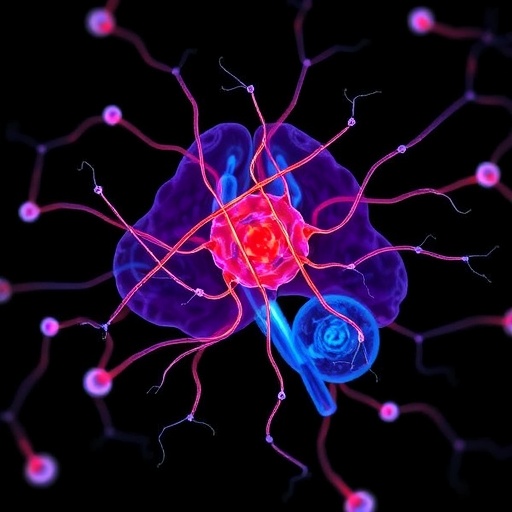The aging brain is subject to myriad changes, many of which contribute to the development of devastating neurological disorders such as Alzheimer’s disease and stroke. Among the critical elements impacted by the aging process is the blood-brain barrier (BBB), a specialized and dynamic interface that maintains cerebral homeostasis by tightly regulating the exchange of substances between the bloodstream and the neural environment. Increasing evidence now links BBB dysfunction to neurodegeneration, positioning it not merely as a consequence but potentially a driving force in disease progression. Recent groundbreaking research spearheaded by Professor Eng H. Lo at Massachusetts General Hospital and Harvard Medical School brings new insights into the cellular and molecular underpinnings of BBB deterioration with age, particularly focusing on astrocyte-endothelial cell crosstalk mediated by the renin-angiotensin system.
The BBB is a sophisticated multicellular structure comprising endothelial cells, pericytes, astrocytic endfeet, and the surrounding basement membrane. Each component plays a vital role in maintaining barrier integrity and regulating permeability. Astrocytes, a major glial cell type, intimately ensheathe cerebral microvessels and provide biochemical support that fortifies the endothelial tight junctions essential for BBB function. However, the effect of aging on astrocyte physiology and its subsequent impact on endothelial barrier properties has remained elusive, representing a significant knowledge gap in neurovascular biology. Professor Lo’s team approached this challenge by examining how cellular senescence influences astrocyte signaling to brain endothelial cells.
Central to their investigation was the hypothesis that aging astrocytes upregulate angiotensinogen (AGT), the precursor molecule of angiotensin II (Ang-II), a potent vasoactive peptide known to modulate vascular tone and permeability. Ang-II signaling has been extensively studied in peripheral vasculature but understudied in the context of neurovascular aging. Employing both in vitro co-culture models and conditioned media transfers between astrocytes and endothelial cells, the research demonstrated that young astrocytes robustly enhance endothelial barrier function, whereas senescent astrocytes lose this protective capability. Senescent astrocytes exhibited heightened AGT expression which correlated with increased BBB permeability and altered tight junction protein expression in brain endothelial cells.
To model astrocyte aging, the team used cultures subjected to low and high cumulative population doublings (CPD), representing youthful versus senescent states respectively. Functional assays revealed that endothelial monolayers exposed to senescent astrocytes or their secreted factors displayed significant barrier disruption, characterized by increased passage of albumin and downregulation of key BBB proteins such as occludin and claudin-5. Notably, targeted silencing of AGT in senescent astrocytes via small interfering RNA (siRNA) partially restored endothelial barrier function, implicating elevated AGT and subsequent Ang-II signaling as a causal mechanism in BBB compromise.
These findings illuminate a novel and critical pathway linking cellular aging in astrocytes to vascular dysfunction in the brain’s microenvironment. The elevated production of AGT by senescent astrocytes ultimately translates into paracrine Ang-II activity on endothelial cells, augmenting permeability and undermining BBB integrity. This aberrant signaling cascade offers a plausible molecular explanation for the enhanced BBB leakiness frequently observed in aging and related neurodegenerative conditions. Moreover, the work underscores the importance of astrocyte-endothelial interactions in sustaining neurovascular health and highlights the renin-angiotensin system as a therapeutic target to alleviate age-associated BBB decline.
Considering the wealth of pharmacological tools available to modulate angiotensin signaling, this research paves the way for translational studies aimed at restoring BBB function in elderly populations. Drugs such as angiotensin receptor blockers (ARBs) or ACE inhibitors, currently used in cardiovascular medicine, may hold promise in fortifying the aging neurovascular unit and preventing BBB breakdown. The prospect of repurposing existing therapeutics to mitigate age-related cognitive decline or vascular contributions to dementia is particularly tantalizing and warrants extensive clinical exploration.
Furthermore, the study emphasizes the complexity of the neurovascular unit and its dynamic remodeling during senescence. The interplay between different cell types—astrocytes, endothelial cells, pericytes—and extracellular matrix components evolves over time, influencing cellular communication networks and barrier properties. Age-induced shifts in astrocyte phenotype, including the emergence of pro-inflammatory and reactive states, may also synergize with increased AGT expression to exacerbate neurovascular dysfunction. Future investigations are needed to delineate how astrocyte heterogeneity impacts BBB regulation across the lifespan.
Intriguingly, this research provides a framework to better understand how vascular pathology integrates with classical neurodegenerative processes. BBB leakiness leads to the infiltration of peripheral immune cells, accumulation of neurotoxic blood-derived substances, and disruption of nutrient transport—eventually fostering a hostile microenvironment for neurons. The discovery that astrocyte senescence mediates these changes via angiotensin signaling equips scientists with critical mechanistic insights linking aging, vascular integrity, and brain health.
In summary, Professor Eng H. Lo and colleagues reveal a pivotal role for astrocytic angiotensinogen upregulation in the deterioration of endothelial barrier function within the aging brain. Their meticulous work bridges cellular senescence with molecular pathways impacting BBB permeability and opens promising avenues for intervention. As the global population ages, understanding and targeting neurovascular aging will be indispensable for combating cognitive decline and neurological disorders. This study represents a significant leap forward in decoding the cellular dialogues governing BBB resilience and vulnerability in the aging central nervous system.
Subject of Research: Cells
Article Title: Effects of senescence on astrocyte to brain endothelial cell signaling
News Publication Date: 21-Sep-2025
References:
DOI: 10.1002/nep3.70013
Image Credits: Professor Eng H. Lo from Massachusetts General Hospital and Harvard Medical School
Keywords: Blood brain barrier, Aging, Astrocytes, Angiotensinogen, Neurovascular unit, Endothelial cells, Senescence, Alzheimer’s disease, Neurodegenerative diseases, Brain, Molecular biology, Neuroscience




